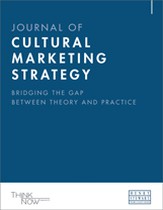Using neuroscience to improve ad impact: How new research tools can advance cultural marketing
Abstract
Advances in neuroscience and neuromarketing research finally allow us to assess non-cognitive processes, such as emotions, that have long been suspected to be crucial drivers of advertising effects. As we are experiencing rapid changes in technology, media usage, shopping options, consumer behaviour, and society, effective, fact-based decisions on marketing strategies are becoming more important and also more difficult. As a result, we need better, more precise tools that allow us to bring science-based evidence to our decision making. This paper reviews these new tools, the evidence for their effectiveness, and demonstrates how they can be — and why they should be — employed to improve marketing and advertising to multi-cultural and multi-lingual consumers in the USA and other countries.
The full article is available to subscribers to the journal.
Author's Biography
Horst Stipp joined the Advertising Research Foundation in January 2011 after a long career in research at NBC Universal. Currently, he serves in the ARF’s research and innovation team as EVP research, global & ad effectiveness. Stipp received his PhD in sociology from Columbia University and has been involved in media research for 40 years. His publications, in English and German, cover a wide range of topics and he frequently presents at conferences, both in the United States and in Europe. Some of his work on changes in media use and their impact on consumer behaviour and advertising in the digital age has been published in the Journal of Advertising Research. His teaching experience includes a seminar on media metrics at Columbia University’s Business School from 2000–2010 and frequent guest lectures.
